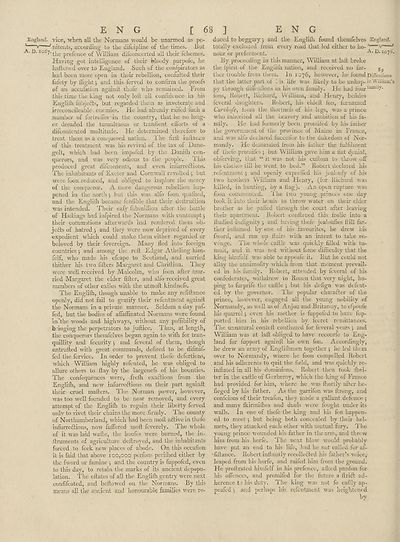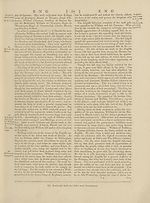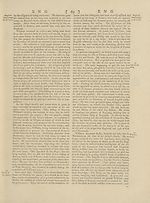Encyclopaedia Britannica, or, a Dictionary of arts, sciences, and miscellaneous literature : enlarged and improved. Illustrated with nearly six hundred engravings > Volume 8, ELE-FOR
(80) Page 68
Download files
Complete book:
Individual page:
Thumbnail gallery: Grid view | List view

ENG [ 68 ] ENG
England, vice, 'when all the Normans would be unarmed as pe-
^ ^ nitents, according to the difciplinc of the times. But
. D. I^- 7-i:]ie prefence of William difconcerted all their fchemes.
Having got intelligence of their bloody purpofe, he
haltcned over to England. Such of the confpirators as
liad been more open in their rebellion, conlulted their
fafety by flight \ and this ferved to confirm the proofs
of an accufation againit thofe who remained. From
this time the king not only loft all confidence in his
Enp-lilh fubiedts, but regarded them as inveterate and
irreconcileable. enemies. He had already railed Inch a
number of fortreiles in the country, that he no long¬
er dreaded the tumultuous or tranlient eftorts of a
difeontented multitude. He determined therefore to
treat them as a conquered nation. The firit inftaixe
of this treatment was his revival of the tax of Dane-
gelt, which had been impofed by the Danifii con¬
querors, and was very odious to the people. This
produced great difeontents, and even infurredlions.
The inhabitants of Exeter and Cornwall revolted j but
were foon reduced, and obliged to implore the mercy
of the conqueror. A more dangerous rebellion hap¬
pened in the north 3 but this was alfo foon qualhed,
and the Englilh became fenfible that their deltrublion
was intended. Their eafy fubmiflion after the battle
of Haftings had infpired the Normans with contempt;
their commotions afterwards had rendered them ob¬
jects of hatred j and they were now deprived of every
expedient which could make them either regarded or
beloved by their fovereign. Many fled into foreign
countries j and among the reft Edgar Atheling him-
felf, who made his efcape to Scotland, and carried
thither his two fillers Margaret and Chriilina. They
were well received by Malcolm, who foon after mar¬
ried Margaret the elder filler, and alfo received great
numbers of other exiles with the utmoil kindnefs.
The Englilh, though unable to make any refiilance
openly, did not fail to gratify their refentment againft
the Normans in a private manner. Seldom a day paf-
fed, but the bodies of afl'affinated Normans were found
in'the woods and highways, -without any poffibility of
bringing the perpetrators to jultice. Thus, at length,
the conquerors themfelves began again to wilh for tran¬
quillity and fecurity; and feveral of them, though
entrulled with great commands, defired to be difmif-
fed the fervice. In order to prevent thefe defertions,
which William highly refented, he was obliged to
allure others to Hay by the largenefs of his bounties.
The confequences were, frelh exactions from the
Englilh, and new infurreblions on their part againit
their cruel mailers. The Norman power, however,
was too well founded to be now removed, and every
attempt of the Englilh to regain their liberty ferved
only to rivet their chains the more firmly, idle county
of Northumberland, which had been moll active in thefe
infurre£lions, now fullered molt feverely. The whole
of it was laid walte, the houfes were burned, the in-
llruments of agriculture deltroyed, and the inhabitants
forced to feek new places of abode. On this oceafion
it is faid that above 100,000 perfons perilhed either by
the fword or famine ; and the country is fuppofed, even
to this day, to retain the marks of its ancient depopu¬
lation. The eftates of all the Englilh gentry were next
confifcated, and bellowed on the Normans. By this
menus all the ancient and honourable families were re¬
duced to beggary \ and the Englilh found themfelves England,
totally excluded from every road that led cither to ho- '—- v-—J
nour or preferment. A' I07°<
By proceeding in this manner, William at lall broke
the Ipint of the Englilh nation, and received no far-
ther trouble from them. In 1076, however, he found Difienfions
that the latter part ox /is lire was likely to be unhap-in William’s
py through difl'enfions 111 his own family. He had four
Ions, Robert, Richard, William, and Henry, bolides
feveral daughters. Robert, his eldelt Ion, furnamed
Cur thofe, irom the Ihortnels of his legs, was a prince
who inherited all the bravery and ambition of his fa¬
mily. He had formerly been proiniied by his father
the government of the province of Maine in France,
and was alfo declared iuccelior to the dukedom of Nor¬
mandy. He demanded from his father the fulfilment
of thefe promifes j but William gave him a flat denial,
obferving, that “ it was not his cuftorn to throw off
his clothes till he went to bed.” Robert declared his
.refentment j and openly expreffed his jealoufy of his
twro brothers William and Henry, (for Richard was
killed, in hunting, by a llag). An open rupture was
foon commenced. The two young princes one day
took it into their heads to throw water on their elder
brother as he palled through the court after leaving
their apartment. Robert conllrued this frolic into a
itudied indignity ; and having thefe jealoufies ftill far¬
ther inflamed by one of his favourites, he drew Iris
fword, and ran up Hairs with an intent to take re¬
venge. The whole caille was quickly filled with tu¬
mult, and it was not without feme difficulty that the
king himfelf was able to appeafe it. But he could not
allay the annimofity which from that moment prevail¬
ed in his family. Robert, attended by fcveral of his
confederates, withdrew to Rouen that very night, ho¬
ping to furprife the caftle ; but his defign w as defeat¬
ed by the governor. The popular character of the
prince, however, engaged all the young nobility of
Normandy, as well as of Anjou and Britanny, to efpoufe
his quarrel j even his mother is fuppofed to have fup-
po'rted him in his rebellion by iecret remittances.
The unnatural conteft continued for feveral years 5 and
William v/as at lall obliged to have recourfe to Eng¬
land for fupport againll his owrn fon. Accordingly,
he drew an army of Englilhmen together j he led them
over to Normandy, where he foon compelled Robert
and his adherents to quit the field, and wTas quickly re-
inllated in all his dominions. Robert then took ftiel-
ter in the caftle of Gerberoy, which the king of France
had provided for him, wfliere he w-as fliortly after be-
fieged by his father. As the garrifon was ftrong, and
confcious of their treafon, they made a gallant defence 5
and many fldrmilhes and duels were fought under its
vralls. In one of thefe the king and his fon happen¬
ed to meet ; but being both concealed by their hel¬
mets, they attacked each other with mutual fury. The
young prince wounded his father in the arm, and threw
him from his herfe. The next blow would probably
have put an end to his life, had he not called for af-
Tiftance. Robert inftantly recollected his father’s voice,
leaped from his horfe, and raifed him from the ground.
He proftrated himfelf in his prefence, a flee d pardon for
his offences, and promifed for the future a Uriel ad¬
herence to his duty. The king vTas not fo eafily ap-
peafed j and perhaps his refentment was heightened
England, vice, 'when all the Normans would be unarmed as pe-
^ ^ nitents, according to the difciplinc of the times. But
. D. I^- 7-i:]ie prefence of William difconcerted all their fchemes.
Having got intelligence of their bloody purpofe, he
haltcned over to England. Such of the confpirators as
liad been more open in their rebellion, conlulted their
fafety by flight \ and this ferved to confirm the proofs
of an accufation againit thofe who remained. From
this time the king not only loft all confidence in his
Enp-lilh fubiedts, but regarded them as inveterate and
irreconcileable. enemies. He had already railed Inch a
number of fortreiles in the country, that he no long¬
er dreaded the tumultuous or tranlient eftorts of a
difeontented multitude. He determined therefore to
treat them as a conquered nation. The firit inftaixe
of this treatment was his revival of the tax of Dane-
gelt, which had been impofed by the Danifii con¬
querors, and was very odious to the people. This
produced great difeontents, and even infurredlions.
The inhabitants of Exeter and Cornwall revolted j but
were foon reduced, and obliged to implore the mercy
of the conqueror. A more dangerous rebellion hap¬
pened in the north 3 but this was alfo foon qualhed,
and the Englilh became fenfible that their deltrublion
was intended. Their eafy fubmiflion after the battle
of Haftings had infpired the Normans with contempt;
their commotions afterwards had rendered them ob¬
jects of hatred j and they were now deprived of every
expedient which could make them either regarded or
beloved by their fovereign. Many fled into foreign
countries j and among the reft Edgar Atheling him-
felf, who made his efcape to Scotland, and carried
thither his two fillers Margaret and Chriilina. They
were well received by Malcolm, who foon after mar¬
ried Margaret the elder filler, and alfo received great
numbers of other exiles with the utmoil kindnefs.
The Englilh, though unable to make any refiilance
openly, did not fail to gratify their refentment againft
the Normans in a private manner. Seldom a day paf-
fed, but the bodies of afl'affinated Normans were found
in'the woods and highways, -without any poffibility of
bringing the perpetrators to jultice. Thus, at length,
the conquerors themfelves began again to wilh for tran¬
quillity and fecurity; and feveral of them, though
entrulled with great commands, defired to be difmif-
fed the fervice. In order to prevent thefe defertions,
which William highly refented, he was obliged to
allure others to Hay by the largenefs of his bounties.
The confequences were, frelh exactions from the
Englilh, and new infurreblions on their part againit
their cruel mailers. The Norman power, however,
was too well founded to be now removed, and every
attempt of the Englilh to regain their liberty ferved
only to rivet their chains the more firmly, idle county
of Northumberland, which had been moll active in thefe
infurre£lions, now fullered molt feverely. The whole
of it was laid walte, the houfes were burned, the in-
llruments of agriculture deltroyed, and the inhabitants
forced to feek new places of abode. On this oceafion
it is faid that above 100,000 perfons perilhed either by
the fword or famine ; and the country is fuppofed, even
to this day, to retain the marks of its ancient depopu¬
lation. The eftates of all the Englilh gentry were next
confifcated, and bellowed on the Normans. By this
menus all the ancient and honourable families were re¬
duced to beggary \ and the Englilh found themfelves England,
totally excluded from every road that led cither to ho- '—- v-—J
nour or preferment. A' I07°<
By proceeding in this manner, William at lall broke
the Ipint of the Englilh nation, and received no far-
ther trouble from them. In 1076, however, he found Difienfions
that the latter part ox /is lire was likely to be unhap-in William’s
py through difl'enfions 111 his own family. He had four
Ions, Robert, Richard, William, and Henry, bolides
feveral daughters. Robert, his eldelt Ion, furnamed
Cur thofe, irom the Ihortnels of his legs, was a prince
who inherited all the bravery and ambition of his fa¬
mily. He had formerly been proiniied by his father
the government of the province of Maine in France,
and was alfo declared iuccelior to the dukedom of Nor¬
mandy. He demanded from his father the fulfilment
of thefe promifes j but William gave him a flat denial,
obferving, that “ it was not his cuftorn to throw off
his clothes till he went to bed.” Robert declared his
.refentment j and openly expreffed his jealoufy of his
twro brothers William and Henry, (for Richard was
killed, in hunting, by a llag). An open rupture was
foon commenced. The two young princes one day
took it into their heads to throw water on their elder
brother as he palled through the court after leaving
their apartment. Robert conllrued this frolic into a
itudied indignity ; and having thefe jealoufies ftill far¬
ther inflamed by one of his favourites, he drew Iris
fword, and ran up Hairs with an intent to take re¬
venge. The whole caille was quickly filled with tu¬
mult, and it was not without feme difficulty that the
king himfelf was able to appeafe it. But he could not
allay the annimofity which from that moment prevail¬
ed in his family. Robert, attended by fcveral of his
confederates, withdrew to Rouen that very night, ho¬
ping to furprife the caftle ; but his defign w as defeat¬
ed by the governor. The popular character of the
prince, however, engaged all the young nobility of
Normandy, as well as of Anjou and Britanny, to efpoufe
his quarrel j even his mother is fuppofed to have fup-
po'rted him in his rebellion by iecret remittances.
The unnatural conteft continued for feveral years 5 and
William v/as at lall obliged to have recourfe to Eng¬
land for fupport againll his owrn fon. Accordingly,
he drew an army of Englilhmen together j he led them
over to Normandy, where he foon compelled Robert
and his adherents to quit the field, and wTas quickly re-
inllated in all his dominions. Robert then took ftiel-
ter in the caftle of Gerberoy, which the king of France
had provided for him, wfliere he w-as fliortly after be-
fieged by his father. As the garrifon was ftrong, and
confcious of their treafon, they made a gallant defence 5
and many fldrmilhes and duels were fought under its
vralls. In one of thefe the king and his fon happen¬
ed to meet ; but being both concealed by their hel¬
mets, they attacked each other with mutual fury. The
young prince wounded his father in the arm, and threw
him from his herfe. The next blow would probably
have put an end to his life, had he not called for af-
Tiftance. Robert inftantly recollected his father’s voice,
leaped from his horfe, and raifed him from the ground.
He proftrated himfelf in his prefence, a flee d pardon for
his offences, and promifed for the future a Uriel ad¬
herence to his duty. The king vTas not fo eafily ap-
peafed j and perhaps his refentment was heightened
Set display mode to:
![]() Universal Viewer |
Universal Viewer | ![]() Mirador |
Large image | Transcription
Mirador |
Large image | Transcription
Images and transcriptions on this page, including medium image downloads, may be used under the Creative Commons Attribution 4.0 International Licence unless otherwise stated. ![]()
| Permanent URL | https://digital.nls.uk/192264459 |
|---|
| Attribution and copyright: |
|
|---|
| Description | Ten editions of 'Encyclopaedia Britannica', issued from 1768-1903, in 231 volumes. Originally issued in 100 weekly parts (3 volumes) between 1768 and 1771 by publishers: Colin Macfarquhar and Andrew Bell (Edinburgh); editor: William Smellie: engraver: Andrew Bell. Expanded editions in the 19th century featured more volumes and contributions from leading experts in their fields. Managed and published in Edinburgh up to the 9th edition (25 volumes, from 1875-1889); the 10th edition (1902-1903) re-issued the 9th edition, with 11 supplementary volumes. |
|---|---|
| Additional NLS resources: |
|

